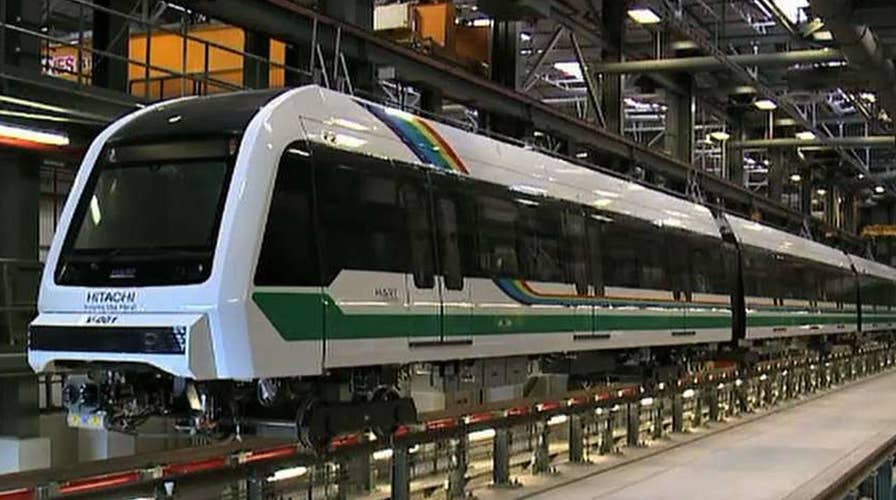Troubled transit project a taxpayer boondoggle in paradise?
Honolulu's rail transit project is years behind schedule and billions over budget; William La Jeunesse reports from Hawaii
One of Hawaii’s most well-known governors is appealing to President Trump to end funding for the state’s most notorious government “boondoggle” project.
The controversial 20-mile elevated heavy steel rail system now under construction on Oahu is slated to cost $10 billion or $500 million per mile, former Hawaii Gov. Benjamin Cayetano said, “the most costly rail project in the world.”
“As a lifelong Democrat and former governor of Hawaii, I opposed your candidacy,” said Cayetano in a statement published in a full-page newspaper advertisement in The Washington Post on Friday and provided to Fox News. “I must admit, however, that you are on the right track scrutinizing wasteful spending on pork barrel projects.”
NORTH KOREA TENSIONS HAVE HAWAII POLS REVISITING EMERGENCY ATTACK PLANS
Cayetano, governor of Hawaii from 1994 to 2002, met Trump in Honolulu in 1998 when Trump’s Miss Universe Pageant was held there.
“I recall you commented on the beauty of Honolulu,” Cayetano said in his appeal to Trump. “The rail project plans include seven massive elevated rail stations 50-60 feet high and the 35-foot high elevated rail line through the heart of downtown Honolulu. If built, this will change the beauty and ambience of the city forever.”
City officials initially promised that the rail would reduce the current level of traffic congestion dramatically, Cayetano said. But the final environmental impact statement reported the rail would reduce traffic congestion by under 2 percent and noted “traffic congestion will be worse in the future with rail than what it is today (without rail).”
The project is so over budget that the city and county of Honolulu, which includes all of Hawaii’s main island of Oahu, does not have the funds to complete the 20-mile system, falling $3 billion short and six years behind schedule, Cayetano said.
HAWAII WOMAN'S DOG SHOT, KILLED AT HONOLULU AIRPORT
“Internal emails among [Federal Transit Administration] staff revealed there was much doubt and cynicism about rail and the city’s multi-million-dollar public relations campaign, yet the FTA did nothing and is now on the verge of providing the remaining $800 million of the $1.5 billion grant,” Cayetano said.
Honolulu’s rail project was initially driven more by politics, pushed through by the powerful U.S. Sen. Daniel K. Inouye, D-Hawaii, who was then chairman of the Senate Appropriations Committee, Cayetano said. Inouye, proud of securing billions of dollars in pork barrel projects for Hawaii over his 50 years in political office, died in December 2012.
Numerous critics of the project want the Trump administration to terminate the FTA’s Full Funding Grant Agreement, which would force the city to consider less costly transportation alternatives.
“Honolulu’s rail project does not deserve a single dollar more from the federal government,” Cayetano said. “It has become a poster boy for how politics, incompetence, disinformation and outright lies are at the root of wasteful rail projects which do little for the public except raise taxes.”
The project was initially pushed through in 2008 by Honolulu Mayor Mufi Hannemann, who was backed by the steel workers union among other construction unions who’d benefit from the project, and an initiative supported by 50.8 percent of the voters. The current Honolulu Mayor, Kirk Caldwell, is one of the project’s main advocates and has pushed to make Oahu’s “temporary” general excise tax increase permanent to fund the project.
"I think it's better to continue to march forward,” Caldwell said about the rail, which is already visibly under construction in West Oahu.
However, the project’s cost could balloon even further as it moves into downtown Honolulu, said Panos Prevedouros, a professor of engineering at the University of Hawaii, and a world-renowned expert in transportation projects.
"They cannot complete the four in-town miles because those are very expensive and we don't have an actual budget for them,” Prevedouros said, noting politicians low-balled the cost and misrepresented the benefits to easing traffic.
"It is political corruption,” Prevedouros said about the reason the project was approved and continues to move forward. “There are a lot of funds, a lot of money circulating, for a totally useless project.”












































